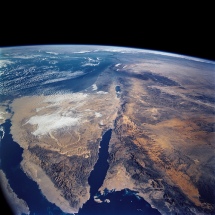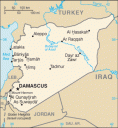
In my continuing series to examine Facebook’s integration in Middle Eastern and Muslim countries comes the news: Syria says no to Facebook.
It is widely believed that the Syrian government’s blocking of Facebook is intended to shut down freedom of speech that might endanger the existing government.

Blocking websites and net applications is nothing new for Syria. Newspapers published from abroad are blocked for fear of the ideas they might contain.
But is it a knee jerk reaction for the West to criticize Syria in this way? At this point in world history, we have the incredible advantage of going to Syrian bloggers to find out what is the word on the street. How do average Syrians react to this development?
Opinions from the Syrian Cyber-Street
Here are some opinions from the street. The Jerusalem Post has collected the following feedback:
Ammar al-Qurabi, Head of the National Association of Human Rights in Syria:
“We have asked officials and they said Facebook could become a conduit for Israeli penetration of our youth, but the real reason for blocking the forum is because it provides for criticism of the authorities. Now there is an ‘Internet Political Crimes’ ward at one prison. Internet cafes have been required to limit their communications services.”
Dania al-Sharif, women’s rights advocate:
“Facebook helped to further civil society in Syria and form civic groups outside government control. That is why it has been banned.”
Mais al-Sharbaji, professional photographer and former Facebook user:
“They cut off communications between us and the outside world. We are used to this behavior from our government.”
Syrian Bloggers Speak
Tamara of MidEast Youth had this to say:

“The Syrian people are smart enough to make up their own minds about what is going on in the world. And from my point of view the Syrian government has little to fear of its people.
It is only with real freedom that the people can stand by their governments, and help protect their nation. Allow the Syrian people to be humanised, to be seen and to be heard, so that we can avoid another war.”
Golaniya asserts:
“My theory? I think the Syrian officials don’t have a thorough idea how Syrians are facebooking, I think they did not block Facebook–the-site, but the unfamiliar reaction to this site, the unknown consequences of this reaction that might be very much, uncontrolled!”

Alloush (translated via Global Voices) posits:
“Soon, Google may be banned and with that the Internet in Syria will be an internal system only, which will enable you to surf through the websites of the companies which make ice cream and chewing gum. That would really be interesting.
Blocking access to such sites which are rich in information causes damage to Syrians. First of all, they are a slap against the free promotion of Syria and secondly, they deny Syrians access to services which are available for people around the world. I hope those responsible for this policy would reconsider their censorship policies.”
Mohammad (translated via Global Voices) adds:
“By Allah, I am embarrassed and don’t know where to start but I am certain that none of the Internet users in Syria were surprised when Facebook was blocked. I was surprised that it wasn’t. Just imagine having a site which starts with w and ends with .com and not having it banned in Syria!”
Getting Realistic: What’s the Big Deal?

Now Syria is not a nation known for democracy, so what is the big deal about blocking Facebook? Facebook, of all things, should not be what we get rallied up about in the battle for Middle East peace.
But in this advancing age of social networks and globalization, our ability to connect and communicate with each other beyond culture and geography is one of the great democratizing factors– and that is a big deal.
Technological Integration
In case you wondering about Syria’s ultimate potential for technology integration, its current status– beyond all of this– is not looking good. In its population of 19.3 million, there are only:

- 2.9 million people land line phones
- 4.675 mobile phones
- 1.5 million internet users
That’s quite low and is both indicative and a predictor of its level of development. Add this to Syria’s low life expectancy and literacy rates, it looks as if Syria needs to do some serious work domestically. (On the plus side, at 11% of its population below the poverty line, Syria is doing much better than some other Middle Eastern countries.)
The bottom line is that income earned from oil only goes so far if it is not benefiting the development status of the nation as a whole.
Recommended Reading
I had the pleasure of citing two of my favorite websites for global and Middle Eastern voices in this post. You can learn more about them here:
To learn more about Facebook and its integration into Muslim and Middle Eastern countries, read:
- “Facebook in Turkey: What Makes Turkey #1?”
- “Israel Facebook Network Goes Viral: Cultural Reporting from the Front Lines”
Credit
Images sourced from the following: NASA satellite map of Middle East, stop sign (multiple sources), Syrian map, telephone, logos (see websites).
Technical Problems
Fewer posts this week are due to the fact that I am having a lot of trouble with WordPress. Please let me know if you are also experiencing problems.
Subscribe
Like what you are reading? Please subscribe by e-mail or feed reader by clicking the sidebar icons.



interesting column – thanks Maya!
Very welcome.
As you can imagine, with all that is going on with the internet in Syria, it is a little challenging to get real opinions from them as it endangers their safety. I was grateful to the others who translated and were in direct connection with people so that I could aggregate their reactions.
Thanks for your comment, Avi.
Maya
[…] Syria Says No to Facebook: Bloggers Talk Back […]
[…] “Syria Says No to Facebook: Bloggers Talk Back” […]
[…] few weeks ago I blogged about how Facebook had been blocked in Syria because it allowed users too much access to global portals and engagement in free speech. It was […]
[…] just started a new position as an Israel writer for Global Voices Online. As you’ve heard me say before, I think it is a great website. Seeking to be a portal to the global blogosphere, it focuses on […]
[…] “Syria Says No to Facebook: Bloggers Talk Back” […]
Am travelling Syria at the moment and I understand that many Syrians simply bypass the Facebook ban. I’ve also been at internet cafes that do so. As a result, it might be that young Syrians are forced to ‘commit internet crime’ in order to stay in touch with their non-Syrian friends. These skills might come in hand when they want to access much more subversive sites. All in all, I think, this facebook ban will bite the Syrian government in the ass….
[…] “Syria Says No to Facebook: Bloggers Talk Back” […]